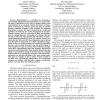Free Online Productivity Tools
i2Speak
i2Symbol
i2OCR
iTex2Img
iWeb2Print
iWeb2Shot
i2Type
iPdf2Split
iPdf2Merge
i2Bopomofo
i2Arabic
i2Style
i2Image
i2PDF
iLatex2Rtf
Sci2ools
TEC
2008
2008
Fingerprinting: Visualization and Automatic Analysis of Prisoner's Dilemma Strategies
Fingerprinting is a technique for generating a representation-independent functional signature for a game playing agent. Fingerprints can be used to compare agents across representations in an automatic fashion. The theory of fingerprints is developed for software agents that play the iterated prisoner's dilemma. Examples of the technique for computing fingerprints are given. The paper summarizes past results and introduces the following new results. Fingerprints of prisoner's dilemma strategies that are represented as finite state machines must be rational functions. An example of a strategy that does not have a finite state representation and which does not have a rational fingerprint function is given: the majority strategy. It is shown that the AllD- and AllC-based fingerprints can be derived from the tit-for-tat fingerprint by a simple substitution. Fingerprints for four new probe strategies are introduced, generalizing previous work in which tit-for-tat is the sole prob...
| Added | 15 Dec 2010 |
| Updated | 15 Dec 2010 |
| Type | Journal |
| Year | 2008 |
| Where | TEC |
| Authors | Daniel A. Ashlock, Eun-Youn Kim |
Comments (0)

